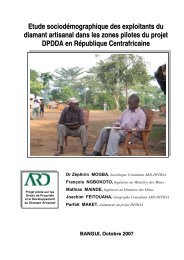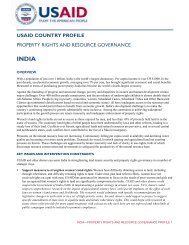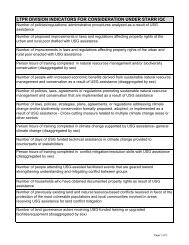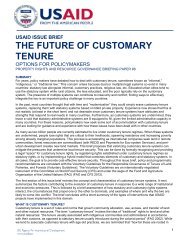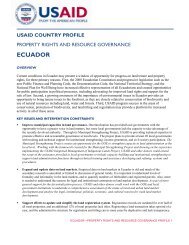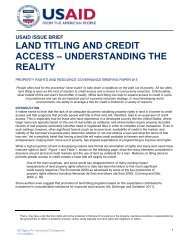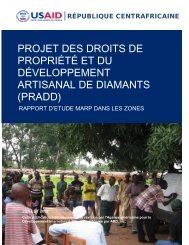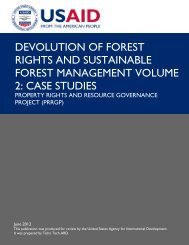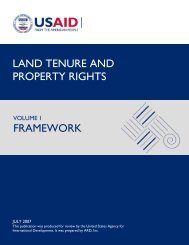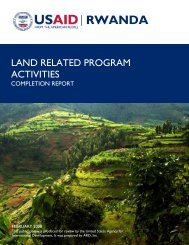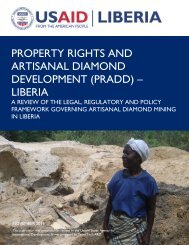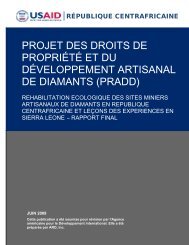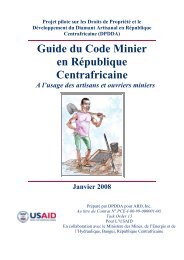Open access lands and <strong>natural</strong> <strong>resource</strong>s, sometimes referred to as “non-<strong>property</strong>,” exemplify lack <strong>of</strong> specific<strong>rights</strong>, or unenforceable <strong>rights</strong>. In contrast to common <strong>property</strong> regimes, open access <strong>resource</strong>s have nonamed and known group that claims <strong>the</strong>m, and no specific <strong>in</strong>stitutional arrangements designed to ensureproper governance <strong>of</strong> <strong>the</strong> <strong>resource</strong>. Also unlike common <strong>property</strong>, <strong>in</strong> open access areas by def<strong>in</strong>ition noparticular <strong>in</strong>dividual or group has authority to exclude anyone from us<strong>in</strong>g <strong>the</strong> <strong>resource</strong>. Open access iscommon <strong>in</strong> mar<strong>in</strong>e contexts, where access to <strong>resource</strong>s beyond a specified distance from land may be freeand unrestricted to all. Open access areas may <strong>in</strong>clude rangelands, forests, or wetlands. It is important to notethat common <strong>property</strong>, public <strong>property</strong>, or private <strong>property</strong> may at times “slip <strong>in</strong>to” open access status wherelocal <strong>in</strong>stitutions, governments, or <strong>in</strong>dividuals responsible for govern<strong>in</strong>g and ma<strong>in</strong>ta<strong>in</strong><strong>in</strong>g <strong>the</strong>m lack <strong>the</strong> abilityto effectively monitor and enforce rules <strong>of</strong> <strong>resource</strong> use. For <strong>in</strong>stance, protected areas legally fall<strong>in</strong>g understate jurisdiction <strong>of</strong>ten experience open access situations (and are hence characterized as “paper parks”), dueto lack <strong>of</strong> effective mechanisms for monitor<strong>in</strong>g and enforcement.In some circumstances “hybrid” <strong>property</strong> regimes exist. These regimes comb<strong>in</strong>e vary<strong>in</strong>g elements <strong>of</strong> <strong>the</strong><strong>rights</strong> regimes <strong>of</strong> private, public and common <strong>property</strong> systems. The def<strong>in</strong><strong>in</strong>g characteristic <strong>of</strong> hybrid<strong>property</strong> regimes is that <strong>the</strong> strands <strong>of</strong> <strong>the</strong> <strong>property</strong> <strong>rights</strong> bundle are shared among private and publicentities. Hybrid <strong>property</strong> <strong>rights</strong> regimes <strong>in</strong>clude co-managed <strong>natural</strong> <strong>resource</strong>s or community-based <strong>natural</strong><strong>resource</strong> <strong>management</strong>, <strong>in</strong> which use and <strong>management</strong> <strong>rights</strong> are shared between government agencies andcommunity-based organizations.As generally perceived, private, public, and common <strong>property</strong> regimes are idealized forms <strong>of</strong> <strong>property</strong>regimes. Even <strong>the</strong> hybrid models generally ignore many ideological, legal, and social aspects systemicallyembedded <strong>in</strong> <strong>property</strong> <strong>rights</strong> systems. As a result, <strong>the</strong> <strong>property</strong> regime types presented above—private, public,common, and open access—have been somewhat dryly referred to as <strong>the</strong> “big four” (Wiber, 2005).Never<strong>the</strong>less, if used sensibly, this taxonomy <strong>of</strong> <strong>property</strong> <strong>rights</strong> regimes is a useful tool for analyz<strong>in</strong>g <strong>property</strong>issues and implications <strong>in</strong>volved <strong>in</strong> program or project development contexts.In addition, multiple forms <strong>of</strong> <strong>property</strong> <strong>rights</strong> <strong>of</strong>ten coexist <strong>in</strong> any given location (Coward, 2006). In o<strong>the</strong>rwords, <strong>in</strong>dividuals may hold <strong>rights</strong> to private lands, and at <strong>the</strong> same time, have <strong>rights</strong> to <strong>resource</strong>s held <strong>in</strong>common such as collectively managed fisheries <strong>resource</strong>s <strong>in</strong> a state-owned wetland. 9 It is important to notealso that <strong>property</strong> <strong>rights</strong> are impermanent and <strong>of</strong>ten change over time. As Coward notes, <strong>property</strong> <strong>rights</strong>arrangements are made and remade, particularly when <strong>the</strong>re are shifts <strong>in</strong> political or economic power.2.2 TENURE SECURITY AND ENFORCEMENT OF PROPERTY RIGHTSTenure security is characterized by enforceability <strong>of</strong> <strong>property</strong> <strong>rights</strong>, and refers to <strong>the</strong> degree to which<strong>in</strong>dividual or group <strong>rights</strong> to land and <strong>natural</strong> <strong>resource</strong>s are recognized and protected. A lack <strong>of</strong> securityimplies <strong>in</strong>sufficient capacity to defend a <strong>property</strong> right aga<strong>in</strong>st compet<strong>in</strong>g claims, encroachment, or eviction.Insecurity <strong>of</strong> <strong>property</strong> <strong>rights</strong> <strong>in</strong>vites conflict, discourages <strong>in</strong>vestment, 10 and <strong>in</strong> some <strong>in</strong>stances createsdis<strong>in</strong>centives for susta<strong>in</strong>able land and <strong>natural</strong> <strong>resource</strong> stewardship, for <strong>in</strong>stance by <strong>in</strong>stigat<strong>in</strong>g land clear<strong>in</strong>g <strong>in</strong>efforts to legitimize land claims (see Unruh et al. 2005). Numerous factors play a <strong>role</strong> <strong>in</strong> determ<strong>in</strong><strong>in</strong>g <strong>the</strong> level<strong>of</strong> tenure security. As summarized <strong>in</strong> Box 4, <strong>the</strong>se <strong>in</strong>clude <strong>the</strong> legitimacy <strong>of</strong> <strong>the</strong> <strong>property</strong> <strong>rights</strong>, <strong>in</strong>stitutions9Such coexist<strong>in</strong>g <strong>property</strong> <strong>rights</strong> are best illustrated <strong>in</strong> a “communal” tenure system not unusual <strong>in</strong> <strong>the</strong> non-Western context. In acommunal tenure, <strong>in</strong>dividual <strong>property</strong> <strong>rights</strong> are <strong>of</strong>ten derived from <strong>the</strong> <strong>property</strong> <strong>rights</strong> <strong>of</strong> a community, such as a l<strong>in</strong>eage, a village, orano<strong>the</strong>r social group (Bruce, 2004). In such a case, <strong>rights</strong> <strong>of</strong> <strong>in</strong>dividual landholders can be limited by <strong>the</strong> community from which those<strong>rights</strong> are derived.10A <strong>good</strong> summary <strong>of</strong> <strong>the</strong> economic advantages obta<strong>in</strong>ed through security <strong>of</strong> tenure is provided <strong>in</strong> Place, Roth and Hazell, Land TenureSecurity and Agricultural Performance <strong>in</strong> Africa: Overview <strong>of</strong> Research Methodology, <strong>in</strong> Bruce and Mighot-Adholla, Search<strong>in</strong>g for Land TenureSecurity <strong>in</strong> Africa, Dubuque, Iowa: Kendall/Hunt Publish<strong>in</strong>g Company, 1994 (sponsored by <strong>the</strong> World Bank).8 ROLE OF PROPERTY RIGHTS IN NRM: GOOD GOVERNANCE AND EMPOWERMENT OF THE RURAL POOR
••••Box 4. Elements <strong>of</strong> Tenure SecurityTenure security is characterized by:Legitimacy,Institutional back<strong>in</strong>g,Clarity, andExcludability.available to support legitimate <strong>property</strong> <strong>rights</strong> (Me<strong>in</strong>zen-Dicket al., 2004), clarity <strong>of</strong> <strong>rights</strong>, and excludability <strong>of</strong> <strong>the</strong>se <strong>rights</strong>(Lawry, 1990).Legitimacy. A lead<strong>in</strong>g factor <strong>in</strong> <strong>property</strong> <strong>rights</strong>enforceability is <strong>the</strong> degree <strong>of</strong> legitimacy <strong>of</strong> <strong>the</strong> <strong>property</strong><strong>rights</strong> system <strong>in</strong> which <strong>the</strong> claimed <strong>rights</strong> are anchored. Ahigh degree <strong>of</strong> legitimacy encourages voluntary complianceon <strong>the</strong> one hand, and discourages challenges to recognized<strong>rights</strong> on <strong>the</strong> o<strong>the</strong>r. A high degree <strong>of</strong> legitimacy reduces <strong>the</strong> need for repressive responses and elaborate<strong>in</strong>stitutions for dispute resolution. Property <strong>rights</strong> ga<strong>in</strong> legitimacy through laws and associated <strong>in</strong>stitutions (seeTable 1). A diverse set <strong>of</strong> laws and <strong>in</strong>stitutions may legitimate <strong>property</strong> <strong>rights</strong> claims; however, <strong>the</strong>se typically<strong>in</strong>volve customary law enforced by a local governance unit such as village <strong>in</strong>stitutions and elected orappo<strong>in</strong>ted <strong>in</strong>stitutional or village authorities. The statutory system is def<strong>in</strong>ed <strong>in</strong> written laws (de jure) enactedand enforced by a central or regional government. 11 Customary <strong>property</strong> <strong>rights</strong> regimes are <strong>of</strong>ten referred toas non-formal (de facto) systems. These typically <strong>in</strong>corporate unwritten rules, <strong>of</strong>ten characterized by <strong>property</strong><strong>rights</strong> systems <strong>of</strong> considerable complexity. Customary <strong>property</strong> <strong>rights</strong> systems, which have evolved along with<strong>the</strong> societies <strong>in</strong> which <strong>the</strong>y are rooted, <strong>of</strong>ten enjoy a degree <strong>of</strong> legitimacy <strong>in</strong> <strong>the</strong> eyes <strong>of</strong> local people that farexceeds that <strong>of</strong> (imposed) statutory laws. Indeed, <strong>in</strong> many parts <strong>of</strong> <strong>the</strong> non-Western world, it is <strong>the</strong> customary<strong>rights</strong> that legitimate <strong>property</strong> <strong>rights</strong> <strong>in</strong> rural areas. For <strong>in</strong>stance <strong>in</strong> West African countries, Toulm<strong>in</strong> (20052006) notes that <strong>rights</strong> to only 2-3 percent <strong>of</strong> land may be formally recognized under statutory law. A majority<strong>of</strong> those parcels are localized <strong>in</strong> urban or o<strong>the</strong>r commercialized areas. Various sets <strong>of</strong> laws (formal and nonformal)may contradict each o<strong>the</strong>r result<strong>in</strong>g <strong>in</strong> overlapp<strong>in</strong>g claims and at times conflict.TABLE 1. SUPPORT FOR ENFORCEMENT OF CUSTOMARY PROPERTY RIGHTS TOVILLAGE LANDS AND NATURAL RESOURCES: THE ROLE OF LEGITIMACYRights HolderCOMMUNITYCOUNCIL OFELDERSHEADS OFHOUSEHOLDSHOUSEHOLDMEMBERSType <strong>of</strong>Rightsownership<strong>rights</strong>transfer <strong>rights</strong><strong>management</strong><strong>rights</strong>use <strong>rights</strong>Basis for LegitimacyTraditional authoritystructures <strong>of</strong> community;shared history andtraditionsTraditional authoritystructures <strong>of</strong> communityTraditional authoritystructures <strong>of</strong> communityand householdsTraditional authoritystructures <strong>of</strong> householdbacked up by communityChallenges to LegitimacyGovernment claims to manage reserves,waterways, watersheds, fisheries and wildlife,as well as o<strong>the</strong>rwise “vacant” lands;development <strong>of</strong> land marketsHereditary posts los<strong>in</strong>g power and authority;fragmentation <strong>of</strong> authority as it shifts fromcommunity-level toward households andnuclear familiesHousehold fragmentation and assertion <strong>of</strong>claims to portions <strong>of</strong> family common lands onpart <strong>of</strong> nuclear familiesMoney economy develops creat<strong>in</strong>g livelihoodoptions for household members beyondfarm<strong>in</strong>g; encourages land markets)Institutional Back<strong>in</strong>g. Institutions are necessary to enforce <strong>the</strong> specific legal system that provides legitimacyto a set <strong>of</strong> <strong>property</strong> <strong>rights</strong>. These <strong>in</strong>stitutions (associated with each legal system) are responsible for mak<strong>in</strong>gand modify<strong>in</strong>g rules <strong>of</strong> <strong>the</strong> regime; monitor<strong>in</strong>g compliance with those rules; sanction<strong>in</strong>g persons who <strong>in</strong>fr<strong>in</strong>gerules; mediat<strong>in</strong>g any result<strong>in</strong>g conflicts; dissem<strong>in</strong>at<strong>in</strong>g <strong>in</strong>formation about results <strong>of</strong> monitor<strong>in</strong>g; sanction<strong>in</strong>g;resolv<strong>in</strong>g disputes; and mobiliz<strong>in</strong>g <strong>resource</strong>s, leaders and staff to conduct all <strong>the</strong>se functions. The11O<strong>the</strong>r sets <strong>of</strong> laws and rules regard<strong>in</strong>g <strong>property</strong> <strong>rights</strong> may apply depend<strong>in</strong>g on <strong>the</strong> context and <strong>the</strong> specific site. For <strong>in</strong>stance, Me<strong>in</strong>zen-Dick et al. (2004) identify religious or “project” laws that may apply to specific areas.ROLE OF PROPERTY RIGHTS IN NRM: GOOD GOVERNANCE AND EMPOWERMENT OF THE RURAL POOR 9



